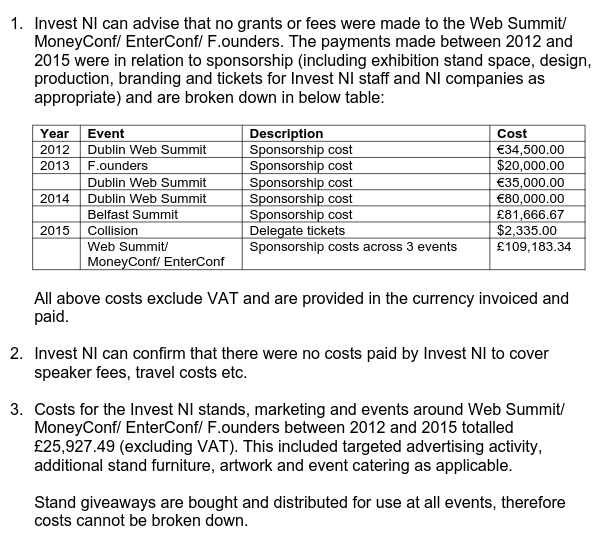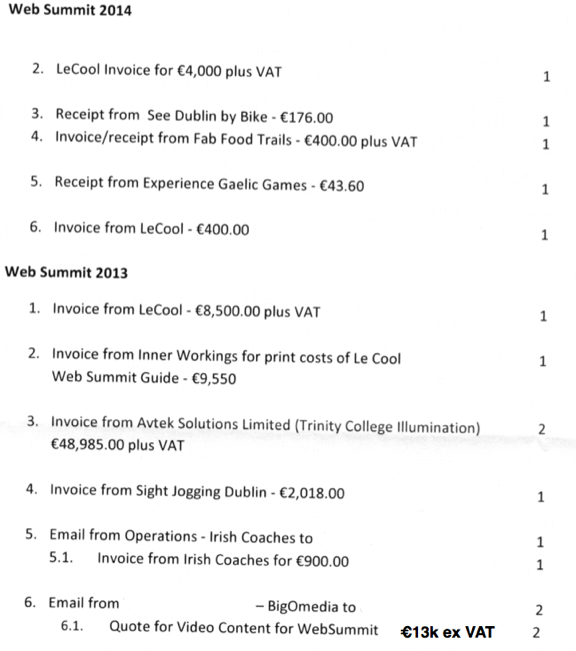There seems to be a growing trend that in order to be happy everyone should work for themselves, everyone should start a startup. Many people are happy to exchange 39 hours of their week for money from a company, they get to do their job and be left alone. That’s probably most people. This is for the others.
2015 and startups
This is an unrefined rant written on a Sunday morning that turned into a whole Sunday and some of a Bank Holiday Monday. It’s about starting businesses and is built around small independent thoughts on startups that I have attempted to weave together into a fabric that has a nice flow to it with edges won’t catch on anything too pointy.
It is also a test for myself to see can I still write interesting things since mostly I’ve abandoned blogging.
My company
I’m coming to this from a position of strength or maybe not giving a shit. My company is 7 years old and is doing okay. Not great, mind. I don’t have any full-time employees as I don’t want to expand it. I also am the “burn it to the ground” type where I fire clients or tell people I don’t want their business.
Having full-time employees would mean I’d have to work for their future and not just mine and I’m too pigheaded for that. To me I find there’s comfort in knowing I can shut this down at anytime and walk away. I gave this 5 years now it’s 7 and I’m almost disappointed with this.
It’s an accidental business. Blog posts on tech got me speaking gigs, they got me training gigs and the day job had to be given up to keep doing it. That’s my “founder story”. Iterations, which I’ll come back to.
Even before then, I started the Blog awards which created the Web Awards which created the Social Media Awards which created the SME Awards. All of those helped me find some great people that I work with at events. Lots of mistakes were made but that helped with refinement. Iterations again.
Without the blog awards none of the rest of the events would probably have happened. The Sockies 2015 generated revenue of about €40k but the profit to be honest wasn’t much and it created one motherfucker of a VAT bill. A proper manager would I’m sure make it a valuable entity but see above! But we got 650 people giving a standing ovation to the Yes Equality social media team. That’s a fine reward.
So that’s my business. It shudders and survives despite of me, not because of me. Not a month goes by where I don’t bounce money around to balance things. Not in an Anglo way though.
On to the rant
So where is this rant coming from? I’ve seen a few people starting startups so they can get some kind of buzz from that. There are better and cheaper legal and illegal ways of getting a buzz dear reader.
I’ve seen other people start businesses because they have an idea that they think is a winner and people have encouraged them to go for it. Others start because they’re unemployed and this is their chance at something. This bit sounds like a riddle but some have listened when they should have ignored and some ignored when they should have been listening.
I’m sharing my advice for those that want to start or are starting and it is based on my jaded views of the startup “journey” in Ireland. There are more blog posts on startup advice than there are people with a David Gray CD I suppose but this is my cover version!
If you think the TV show “Silicon Valley” is what starting a business is like, you’re in dreamland. Don’t bother. Go back to the daydreaming of doing Darth Vader death grips. That show is far too close to home for some people I’ve encountered. Ever watched Dad’s Army? That’s more like it.
Working for yourself means you are going to be on less than minimum wage, that you never leave the office mentally, even if you do physically. It’s. Going. To. Be. Shit. And yet so rewarding as you do it on your terms, such freedom. Stressful freedom!
I’m not a fan of turning a hobby into a business because it ruins the love and you lose your hobby, the thing you can get lost in when all else turns to shit. For me starting something as a part-time gig was a nice measure of whether I wanted to keep doing it.
Of late, what bothers me is those that start because they just want to be in a startup now and they have people encouraging them to leap without looking and are marketing their status as “pre-idea” and “pre-team”. Aren’t we all pre-idea and pre-team? You’re no more a startup than someone that speaks at a TEDx can say they’ve given a TED talk.
Tell me: What do you want to do with this business?
So many come to my training courses and a day later call themselves digital marketing experts. Oh you do training in that? That’s unique isn’t it? Is your training better? Faster? Cheaper? Different to be of value? Aa few 100 more within 10 feet are doing the same. Saturated market.
An Irish facebook? Fuck off. An Irish Snapchat? Fuck off. Yahoo and Google tried that, they failed. You will too. Some people will tell you this failure is good, see the failure section later. They’re wrong.
Now, going back to the digital marketing training idea. if you were to offer all this training online, you now have a global market and it isn’t saturated. That has potential.
To move a few steps ahead you have to have some original take with your idea. What are the junctions in life where money, tech and people intersect? Some junctions are traffic jammed or slow, yes? How can you aid this flow?
Start with software will eat the world by Marc Andreessen
http://www.wsj.com/articles/SB10001424053111903480904576512250915629460
Start with Ev Williams on making a common thing easier by taking out one step
http://www.wired.co.uk/news/archive/2013-10/01/secret-rich-formula
Those two links are really all you need for now. Find other links after starting your startup. I’d suggest you never wait for that one idea and then go all in instantly. The natural high from finding this glorious idea inebriates you to think “this is it, I’m sorted”. It’s not, you’re not. It can easily be that half glass of booze that was so nice last night and you can’t stick today when you look back.
Write down the idea, whiteboard it, examine it, figure out the use of it, figure out who would use it. Ask questions of people who might be users. Let it percolate over time. Outside non-startup pursuits will help you even more here. TV, reading, exercise. That hobby. Do the same for other ideas. Sometimes solutions or thoughts from other ideas fit perfectly with those other ideas. You might start to see the patterns in time. Now you’re trucking.
That idea? It’s rarely a flash of light gifting something from the heaven that’s fully formed. It’s some rough stone you might see and you start to chip at it and then polish but you find other stones around too. A point will come when you finally see this idea properly and you might even find it seemed it was always there but you saw it in the wrong light until now.
Built a startup at a startup weekend? Oh wow, that’s an amazing responsive site and Twitter account you have. Oh look, I can do that in the control panel of my Blacknight account in under 3 minutes. But I didn’t have fun eating pizza and beer.
Pain points/pinch points
Is there something in your life that could be made more efficient or could be automated? Is there something out there right now that does lots of things but it’s only one part you and most others use? Unbundle it.
Is there something during your day that pisses you off and you despise doing and would be willing to pay someone else to do? I’d rather not get a taxi and have to endure some smelly, racist person that won’t shut the fuck up about Irish Water. Hailo! Uber! Servitude as a service
Are you looking at a business and there are many elements of it that make you want to scream because they could do a much better job with some changes? Could they adapt fast enough to your offering and match or better it? Are they a Nokia? WhatsApp does text messaging better and for free. Worth $13.5 billion now. SMS was done yeah?
If people are willing to spend big money – a small market is all you need to start
Willing to spend tiny money or none – huge market is needed for you
Feedback from friends is a fallacy
Don’t ask people whether they think your idea is any good. They’ll lie and tell you yes because they’re nice or spineless or they’re idiots so will tell you yes. Depending on the idea, it might be something your buddy would never use for work or pleasure so why spend time explaining it to them?
Find people who roughly understand what your solution is and see can they contextualise it for their work. “That would work for me if it was able to do this first” is much better than “Amazing, let me know how it works”. NDAs waste everyone’s time. If you thought of this idea about 50 other people are working on it too.
Okay, so now can you just fucking start?
Okay, idea sorted. Don’t fall into the trap of going to the “startup supplies” store and getting all these things before you start. You’re now just prepping for study by tidying your room, reorganising your notes, spending two hours on a study playlist kind of thing. Except afterwards you’re much much poorer. You’re just one more autobiography of a business person away from starting aren’t you? Just start.
Start and as you’re starting you’ll quickly find what you need to keep going and what other stuff just gets in your way. I give out to people every day for having crappy sites and mine is crap. I’m too busy helping others but work comes in due to word of mouth so that’s grand.If I only had my website and not got an existing reputation then I’d be SEOing that site to the hilt and blogging on it and sharing it everywhere.
For me my main thing that I needed was a money person, I got a good accountant for that. I had a laptop, broadband at home, a mobile, access to a car, cash in the bank. Google docs looked after my software and I had a site. For the first two years I used a slow old clunky laptop, it needed to always be plugged in to work. It did me grand.
Bootsrapping aka being cheap
Be a virus, live off a host for a while – Web, FB, Twitter. Use all the platforms that are out there. Don’t buy equipment. Don’t buy software. Just use the free stuff that’s out there even if with limits. Have meetings in the lobby areas of hotels with good wifi. Buy a tea to stay for ages, do work after the meeting. Cheap domain name and hosting for the site. Mailchimp for mailing lists.
If you need hardware, rent it or borrow it. Use the manufacturing workshop of other businesses at night and weekends. It might feel like you’re only reselling for now and you possibly are but your overheads are low aren’t they? You can work on the process then, refine it, swap out and in elements to make you more money per interaction.
Not got a logo, not got cards, have a one pager website, don’t have fancy offices with bean bags and slides? Good. Wait later for these go-faster stripes.
TheJournal, a site I dislike for their wholesale robbing of content in the early days and quizzes these days still ploughed on, they were out there, they used staff from the web generation, they had a better site, they knew how to use website optimisation, they knew how to write catchy headlines. They got how to use Twitter and Facebook as distribution channels.
With that, they had a huge advantage. I remember seeing people quoting Journal pieces on Twitter which were based on Irish Times copy. Years later and their headlines are still better for the same stories.
They are now massively influential and have the systems to start pushing out original content and are doing a better job than “traditional” media with the printing press millstone around their neck. They could have waited for more newswires and building more sources, they didn’t. They could have built more automated systems, they didn’t at that moment. They got out the gap and live tested it all.
Get out and talk to customers
Most startups I’ve encountered failed because of arrogance and/or poor or no sales. I’ll say this later too: If you are going to be your own customer and you only need one customer then keep doing what you’re doing. For everyone else you’ll need to talk to people. Step away from your air-hockey table and ring some customers or customers of a competitor. Not comfortable with people? Hire someone that is or get a buddy to help. Get them to do an online survey. Customers and potential customers will teach you so much about your own offerings even if in the end they don’t buy from you.
Iterate the motherfuck out of it.
The Apple Watch is shit right now. It will replace the phone in 5 years. It’s basic now but it’s first. It has a base of a million plus users in less than a year who will stay loyal to it. Version 2 will be better, version 3 much better. Apple are making money and learning with live data from crappy version 1 though. They waited long enough to have an okay version 1 that will not be disliked and they’ll move on from there.
This okay version 1 is still years ahead of the existing competition and it will be a year before Google/Samsung bring something out but by then version 2 is out. They do it with every product they have. Done is better than perfect, so says Facebook.
Positive hits
Do find small little easy to find measurements for your company. Milestones, milepebbles so you can see you are going in the right direction. The same way you can beat procrastination by splitting a task into easier parts, you ought to try it with your startup work. Even if what you think the most constructive thing you did is water the plants, they’re now done. Start with tiny tasks that take a few minutes and widen it out. I didn’t get X done today but I did get W, Y and Z.
Failure 2.0 is dangerous.
The myth of failure. “Most startups fail” They do. “It’s okay to fail” This is true too. But the current thing seems to be that it’s okay to phone in sick when running a startup and if it fails nobody was responsible as startups always fail, the odds were against you. This is just pulling the “It’s okay to fail” card. Failure is valuable if there’s responsibility and a need to learn from what worked and didn’t work.
In this space we have “startups that failed” and we have people who “failed to do anything worthy with a startup”. Hugely different. Irish Smoked Salmon. Smoked Irish Salmon.
Failing but developing as a person and enriching your experience is what you want if you did fail. The other is grasping nettles again and again and again and “failure experts” telling you that at least you know nettles sting and hard luck and best of luck with the next patch of nettles. And you’re still in that nettle patch two years later. Move one step forward, move another, get pushed back, ask why, ask how to prevent that next time, move one step forward. Is that failing? A long enough timeline and all businesses fail but was it a failure 80% of the time or just the last 5%?
Startup Ecosystems
There is finally a startup ecosystem in Ireland. Ecosystems can be healthy things but in the rush to encourage everyone to be in startupland, there are some dire companies that should not exist. Many can only exist in Ireland because they’re bankrolled by the State in one form or another. Ecosystems of course have predators. They are happy to push the idea that everyone needs to do a startup, the more the merrier. Volume is good for them. Plenty of people will now mentor you for a fee or take the fee from an Enterprise Board. Hypocrisy alert, I do this! Sharks with beards, baseball caps and a can of craft beer telling you “whatevers” in exchange for something. Beer, money, board place, equity.
Some developers will build a site or an app for you and extract as much as they can from you for it. It really isn’t up to them to tell you your idea is useless. Useless or not they need to build and make money. There are some I know who politely tell a potential client to go away and have a think and then come back if they still want to do their idea.
Do you need a fancy website, do you need an app? For some an app is hugely important, for others it’s pure vanity. If you need an app for the sole purpose of proving to people you’re a big deal, walk. We’re still waiting for iPad apps from Facebook and Instagram and Snapchat. Other things have their resources.
Pivot
This “pivot” term that’s used by startups today is mostly bullshit. Today it seems to mean a startup that started with a really bad idea is about to go under so they’re starting something new to get away from that bad idea. Which is a good idea if your new idea is a good idea. That’s where Twitter came from. Mostly though it’s just moving your company on to expensive life support and give yourself the space of a few months before calling it a day.
Where the really good pivots work though are in working on the original idea you find a roadblock of pure granite that means you don’t go further. However on working on smashing through the granite you might come up with new tools or tech and suddenly you’re making something for others to smash granite.
Or when talking to potential customers about your idea they end up presenting to you (without realising it) a bigger more lucrative issue and you realise can solve that.
But that comes from talking to potential customers, really really getting the industry and the issues and fixing it. And fuck all companies do that cos that’s too much work for them especially so many introverted tech people. But tweeting and going to startup wankery events and hanging around with people that will never be customers is enough, right? No.
You might not need a sales strategy (you actually do) but you definitely need a “meet potential customers and see what issues they have” strategy. Some non-customers can be of more value than customers that do give you money.
The Hard Things About Hard Things is my favourite half-a-business book.
http://www.forbes.com/sites/michaellindenmayer/2014/03/07/4-hard-earned-lessons-from-ben-horowitz/
The first half is a thriller that everyone that wants to start a business or has a business should read. So inspiring. The second half is just blog posts lashed on to pad the book. A billion dollar business was born from a failing other business that the guys had created, they took IP from that business and created Opsware. You’re googling the rest of that story.
Flickr and Slack are “pivots” too. Businesses created from other businesses that weren’t doing well or were going nowhere. They were learning even while failing and reset their targets and made Flickr and Slack. Same guy too.. I love these types of pivots because the idea is road tested, poacher becoming gamekeeper in a way and a lot of time it creates a great energy in the startup. Leaner, tougher, looking for revenge.
Killing in the name of … sanity
Sometimes though, it might not go anywhere so just shut it down. It’ll steal full breaths off you for weeks but it will be the best decision. If you’re stuck for a gig at this point, do the circuit of giving talks at startup events and do some startup consultancy on the side.
Incubation centres
You needn’t worry if you’re in an Irish incubation programme, you will never fail, nobody ever fails in those. Nobody fails. hardly anyone passes. In a State funded one you’ll just get acquired for an undisclosed sum. A euro. Or pivot. Lumped in with a butcher, baker and selfie-stick maker. It’s a bit like school, you even get homework and given out to! So it feels like you’re working for them when they should be working for you. Incubation centres are good if those running them are well connected and will connect you. Worth a repeat: make them work for you.
Do also note that those in there that tell you that you’re doing it wrong may not have experience of doing it right. You will be given guidance on building automobiles from people that still have horses and carriages and a “man” to work them. Did they ask for equity? What’s their motivation for helping you? What do they get? Job satisfaction? Run.
While in there you can spend 6 months working on a business plan and get pushed down routes that area dead ends. Only a few years back anyone that wanted to do a web app startup were told middleware was better. Now if you tick Cloud, App, Internet of Things on the form, you’re probably in. Or instead of that business plan let the accountant do cost analysis on your idea in a few days and you build something for a potential customer with the freed up time. Everyone wins an award at the end too. They do graduation ceremonies in playschool now. No difference.
Incubators are a core part of this “ecosystem” idea now. Pretty soon we’ll have an incubator for incubators. Just like you do that whole making a playlist, tidying your room to avoid doing study, incubators, funding structures and initiatives are a handy way of avoiding real work by State orgs. You know, like fixing the tax laws so someone that’s self employed pays more taxes than their own employees who might be on less or the same wage as you.
Accelerators
Accelerators are things for cars, normally balanced with a brake. Speeding while you’re still learning to drive, great idea.
Conferences and events
Startup events
Startup lads bant free drinks. LOL. Pivot. StartupBullshitBingo. Did you watch that latest episode of “Silicon Valley”?
The ecosystem is now replete with obnoxious events on all the time that seem to be more support group AA meetings than anything more. Events on how to fail or something like that. Sponsored by an idiot bank, probably. Startup events on a boat, a plane, a tent,a treehouse, a van, a telephone box.
I do wonder about those that are in startups yet give almost weekly talks about startups to startups. Not busy in work then? Life support startup? Intercom people talking at startup events makes sense. Stripe too. Their customers go there as do potential new customers. Do your customers attend startup events?
Go to conferences where your potential customers are. If staff don’t come back with real leads, chop off one of their fingers. Yak style. Conferences cost time and money. Or start your own event or workshops for customers or potential customers.
Makey Uppey Job Titles
Chief Movement Creator. Director of Online Happiness. Co- Chief Hoody Wearer. Alloys on your 89 L Toyota Starlet. Director will do. The ones with money can see you’re bored with your gig. Careful.
Well that meandered.
TLDR
In summary
- Work on loads of ideas.
- Start.
- Start it as a part-time gig if you want. Switch when the day job is financially interfering with your startup.
- Be really really cheap with everything that allows you to be cheap but not with wages.
- Don’t implement most advice you’re given but listen.
- Skip startup events, you should be too busy.
- Incubators are safe and warm and keep you from the real world.
Read this too if you want:
And?
Just fDIY






